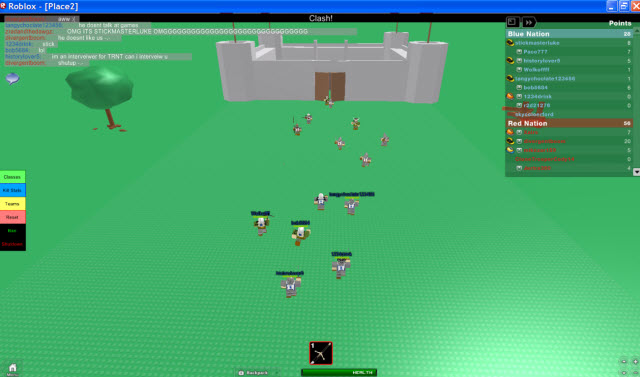
With Roblox, kids are architects of their own games and they learn software coding abilities that can help them later in life. Roblox uses physics to simulate a virtual world, allowing kids to construct things in building-block style. While the games aren’t graphically outstanding, they do remind everyone that a game doesn’t have to have high-end graphics to be fun. And Weber has proven to be a master at this art.
“Roblox is like a building game,” Weber said in an interview. “I started playing because I was always playing with Legos when I was younger.”
AI Weekly
The must-read newsletter for AI and Big Data industry written by Khari Johnson, Kyle Wiggers, and Seth Colaner.
Included with VentureBeat Insider and VentureBeat VIP memberships.
Weber, who took the “Stickmaster Luke” nickname from his early start making stick-characters animations in Roblox, hasn’t made any money from the free games. But he has picked up some skills on how to make games that could serve him well in the years ahead. And earlier this month, Weber attended the first-ever Roblox community gathering, the Roblox Rally, which was attended by more than 1,000 people at the Exploratorium in San Francisco. Lots of kids came up to meet Weber, who just graduated from high school in Pleasant Hill, Calif.
Roblox users build games by resizing virtual bricks to build scenes and characters in the Lua programming language. Then they add scripts other coding for games. The process is relatively simple and it’s a good way to learn programming. Rival game worlds include Second Life and Minecraft. All of these worlds are part of what futurist Paul Saffo calls the “creator economy,” where users aren’t satisfied with passive entertainment and want to create their own.
“I was a complete beginner when I started,” Weber said. “I made quite a few games and most of them were bad. My first hit was one that allowed players to build in real-time with each other and then fight.”
Four years ago, it was a big deal if 60 players played a game at once, but now the audience is measured in thousands. Weber copied some other games to see if he could do them better. Then he got more experimental, making games where trucks fall down a hill and you have to dodge them in order to climb to the top. Weber is pouring increasing amounts of time into each game, though only gets half-way through many games. Each full game takes about 24 hours of work to complete.
[aditude-amp id="medium1" targeting='{"env":"staging","page_type":"article","post_id":322651,"post_type":"story","post_chan":"none","tags":null,"ai":false,"category":"none","all_categories":"business,games,","session":"B"}']
While Weber isn’t making money from his games, he does earn in-game currency every time someone plays a game. And Weber sells virtual T-shirts for 30 “Robucks.” Making money would be nice, but Weber says, “Making games is fun. There’s some hype and notoriety in it, and it’s fun meeting new people.”
As for the future, Weber plans on going to community college.
“I feel like I can do anything now,” he said.
VentureBeat's mission is to be a digital town square for technical decision-makers to gain knowledge about transformative enterprise technology and transact. Learn More
